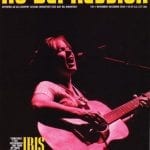Dolorean – Truck drivin’ man
The seemingly endless stretches of highway in the northwest have long proven a haven for isolation-craving individuals — serial killers, for example, cruising, brooding and hatching their violent fantasies. In the case of Portland’s Al James, who has a full-time job driving a delivery truck for a local wine distributor, those long periods behind the wheel allow him to channel, in his words, “a lot of my psychic energy toward the thing I love to do.”
Thankfully, this thing James refers to is his music, which he’s been doing for four years as Dolorean. Granted, the group’s third album, released in October on Yep Roc, is titled Violence In The Snowy Fields, and some of the characters in James’ songs do wander along life’s darker perimeters.
“In The Fall” depicts a man reeling from a traumatic love affair who comes perilously close to suicide. “The Righteous Shall Destroy The Precious” involves an avenging angel-type with a messiah complex. On last year’s Not Exotic, reviewers frequently singled out the Romeo-and-Juliet-gone-terribly-awry storyline of “Hannibal, MO” for its terrifying, Nebraska-like starkness.
But rest easy, residents of Portland and surrounding areas. While James may spend eight hours a day driving up and down your roads, he uses the time productively, “scheming, thinking, writing songs, even designing record packaging in my head.”
Any body counts racked up are purely in the service of literary tradition. In fact, James says he draws his inspiration as much from novelists, essayists and poets (among them Robert Bly, Joyce Carol Oates and John Steinbeck) as he does from the musical artists to whom he’s frequently compared (Willie Nelson, Townes Van Zandt, Jeff Tweedy, Levon Helm and Neil Young).
James, at 28, was somewhat of a late bloomer in his musical aspirations. He attended college on a soccer scholarship and turned to writing midway through his university tenure. “But I guess I look at people and songwriting I really like, and most of them started writing great songs in their late 20s and early 30s,” he notes now.
After testing the waters on the local cafe and coffeehouse folk circuit, in 2000 James hooked up with keyboardist Jay Clarke of Portland group the Standard and issued his first collection of tunes, Sudden Oak, under the name Dolorean. (Yes, it’s a tweaking of maverick automaker John DeLorean’s name, but James indicates that he “just liked the way the word sounded.”)
After picking up ex-Vespertine drummer and harmony vocalist Ben Nugent, Dolorean began playing out, eventually scoring a deal with Yep Roc to release Not Exotic in 2003. Along the way the band expanded to a quartet, adding Nugent’s former Vespertine bandmate James Adair on bass.
Reviews for Not Exotic were enthusiastic, hailing the record’s “somber elegance,” its “weary-beautiful lush folk-pop” and its “atmospheric Americana.” James did experience some mild dismay over the way journalists routinely compared it to the same three records he’d cited in the band’s official bio as being inspirational (The Band’s Music From Big Pink, Neil Young’s Harvest and Nick Drake’s Pink Moon), and decided to shake up the formula somewhat.
Indeed Violence In The Snowy Fields does just that. It commences on a twangy, Buffalo Springfield-like note with “The Search”, next dipping back to elegant/beautiful/atmospheric territory for “Put You To Sleep”, then indulging a ’70s lite-pop vibe on “Dying In Time”, and even finding room for a bar-band country rock detour in the title track.
That title, incidentally, is a sly reference to Robert Bly’s early poetry collection Silence In The Snowy Fields. As with the Dolorean/DeLorean thing, there’s no deep-rooted significance other than a tip of the hat to a favorite author. James adds, though, “If the title Not Exotic was a statement against flowery and unnecessary bells and whistles on a record, this one is more about an unveiling — of not being able to get away with anything, laid bare and open.”
“Unveiled” is an apt description for James’ straightforward singing style and his refreshingly non-oblique, narrative approach to songwriting — traits he claims come from being drawn to records where he can “tap into some sort of authenticity within the songwriter, where you can tell this is what the person is like.”
James cites Dennis Wilson’s obscure 1977 solo album Pacific Ocean Blue as an example. “His voice is like no other, so raw and so passionate,” he says of the late Beach Boy. “I really like it when the delivery matches what’s being said — the words, combined with the quality of their voice.
“And that, I guess, informs the records I make. I try to keep things direct and keep it interesting, too. I want to feel that the voice is speaking directly at me.”




